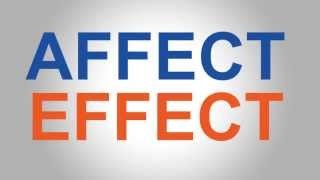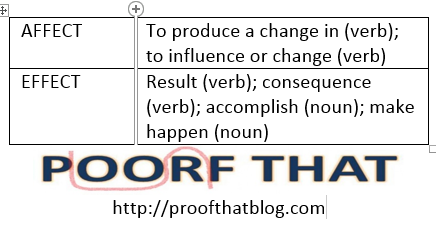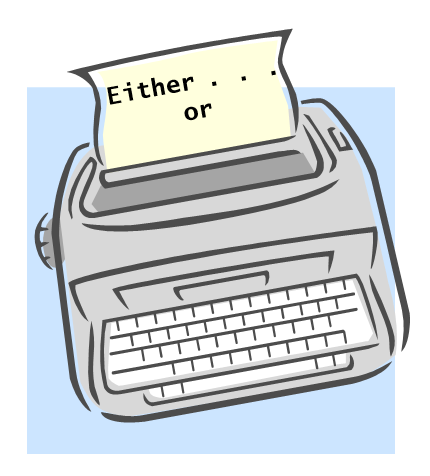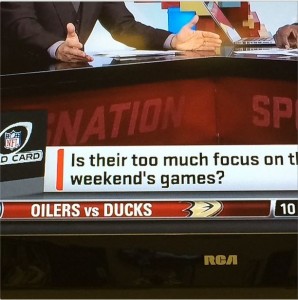 I had a request to write about affect and effect. Since I’ve had trouble with those words in the past myself, I completely understand how confusing they are! Dictonary.com defines affect as a verb (used with an object) meaning:
I had a request to write about affect and effect. Since I’ve had trouble with those words in the past myself, I completely understand how confusing they are! Dictonary.com defines affect as a verb (used with an object) meaning:
- to act on; produce an effect or change in:
“Cold weather affected the crops.“
- to impress the mind or move the feelings of:
“The music affected him deeply.“
- to give the appearance of; pretend or feign:
“to affect knowledge of the situation.“
- to assume artificially, pretentiously, or for effect:
“to affect a Southern accent.”
It is also defined as a noun meaning feeling or emotion.
Effect is defined as a noun:
- something that is produced by an agency or cause; result; consequence:
“Exposure to the sun had the effect of toughening his skin.“
- power to produce results; efficacy; force; validity; influence:
“His protest had no effect.“
And as a verb (used with object):
- to produce as an effect; bring about; accomplish; make happen:
“The new machines finally effected the transition to computerized accounting last spring.“
So what does that mean really? Affect is usually used as a verb to mean to influence or change. Effect is either used as a verb meaning to bring about or as a noun meaning the result or impression. Which would you choose when you hear “The wine didn’t have quite the affect/effect she was hoping for”? Some of these are so close that either could be correct, so you need to dig just a little bit deeper. First, you need to decide if it is a verb (an action word) or a noun (the name of a person, place, object, idea, quality, or activity). “The wine didn’t have quite the [action] she was hoping for.” So the verb definitions are affect to influence or change and effect to bring about. Would you say “The wine didn’t have quite the influence or change she was hoping for” or “The wine didn’t have quite the bring about she was hoping for.” The correct word is affect.
“The new paralegal was affecting/effecting the morale in the office.” The paralegal was creating an action on the morale in the office so was the new paralegal influencing or changing (affecting) the morale or was he bringing about (effecting) the morale? It should be affecting.
“The uncertainty in the legal market affected/effected attendance at the conference.” The uncertainty influenced or changed the attendance or the uncertainty brought about the attendance? Here, it would be affected.
One more for good measure: “The ruling in this case will affect/effect future door-to-door sales.” Will the ruling influence or change sales or will the ruling bring about sales? This should be affect.
We’ve done some practice with affect/effect as verbs, let’s try one as a noun. “The affect/effect of the storm damage won’t be known for some time.” Is it the feeling or emotion of the storm damage that won’t be known or is it the result of the storm damage that won’t be known? It should be effect.
These two words are very confusing. If it will help, copy the chart below and keep it at your desk for a quick reference:



 Follow
Follow
 There is some confusion over whether to use a singular or a plural verb when using the famous connectors or, either . . . or, neither . . . nor, or not only . . . but also. Here is a quick rundown that should help.
There is some confusion over whether to use a singular or a plural verb when using the famous connectors or, either . . . or, neither . . . nor, or not only . . . but also. Here is a quick rundown that should help.




 Here is a compilation of tidbits that didn’t quite warrant their own blog post, but are interesting enough to share.
Here is a compilation of tidbits that didn’t quite warrant their own blog post, but are interesting enough to share.